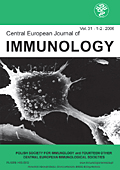
Central European Journal of Immunology
Scope & Guideline
Empowering Research, Enriching Lives
Introduction
Aims and Scopes
- Immunological Mechanisms in Disease:
The journal frequently publishes research on the mechanisms underlying various diseases, including cancer, autoimmune disorders, and infectious diseases, highlighting the role of the immune system in pathogenesis. - Therapeutic Interventions and Biomarkers:
A significant focus is on the development of immunotherapies and the identification of biomarkers that can aid in diagnosis, prognosis, and treatment efficacy, particularly in cancer and chronic inflammatory conditions. - Translational Research:
The journal emphasizes translational research that bridges laboratory findings with clinical applications, fostering the development of novel therapeutic strategies and diagnostic tools. - Inflammation and Immune Response:
Research related to inflammatory processes and the immune response in various conditions, including chronic diseases and infections, is a core area of focus. - Innovative Methodologies:
The journal showcases innovative methodologies in immunological research, including advanced imaging techniques, flow cytometry, and genetic profiling, to enhance the understanding of immune responses.
Trending and Emerging
- COVID-19 and Immunological Responses:
There has been a significant surge in research related to COVID-19, particularly focusing on immune responses to vaccination, long-term immunity, and the implications for patients with pre-existing conditions. - Cancer Immunotherapy Innovations:
Emerging themes in cancer immunotherapy, including novel approaches such as CAR T-cell therapies and immune checkpoint inhibitors, are gaining traction, reflecting the ongoing advancements in cancer treatment. - Microbiome and Immune Interaction:
Research exploring the relationship between the microbiome and immune responses is on the rise, emphasizing the importance of gut health and its implications for systemic immunity. - Biomarkers for Personalized Medicine:
The identification of biomarkers for personalized medicine in immunology is increasingly relevant, as researchers seek to tailor therapies based on individual immune profiles. - Chronic Inflammation and Metabolic Disorders:
The connection between chronic inflammation and metabolic disorders, such as obesity and diabetes, is emerging as a critical area of research, highlighting the role of the immune system in metabolic health.
Declining or Waning
- Traditional Autoimmunity Studies:
Research specifically focused on traditional autoimmune diseases has decreased, possibly due to a growing interest in more complex, multifactorial conditions that involve immune dysregulation. - Basic Immunology without Clinical Application:
Basic studies in immunology that do not directly translate into clinical applications are less frequently published, indicating a trend towards more clinically relevant research. - In vitro Studies with Limited Clinical Relevance:
There has been a noticeable reduction in the publication of in vitro studies that lack direct implications for patient care, as the journal increasingly favors studies with clear clinical implications.
Similar Journals

Immuno
Empowering Discoveries in Immunology, Biochemistry, and GeneticsWelcome to Immuno, a pioneering open-access journal published by MDPI that serves as a key platform for the dissemination of innovative research in the fields of immunology, biochemistry, and genetics. Established in 2021, this journal has rapidly established itself within the academic community, currently ranking in the 53rd percentile in Medicine (miscellaneous) and 50th percentile in Biochemistry, Genetics, and Molecular Biology according to Scopus metrics. With a commitment to advancing our understanding of immune mechanisms and their applications in health and disease, Immuno is dedicated to publishing high-quality peer-reviewed articles that contribute valuable insights to both researchers and practitioners. Positioned in the heart of Switzerland, its global accessibility and diverse editorial board are a testament to its aim to promote knowledge exchange among scientists, practitioners, and students alike. Explore the latest discoveries and advancements in immunological research through Immuno, where your contributions help shape the future of this critical area of study.

Immunotherapy Advances
Advancing the frontier of immunology with cutting-edge research.Immunotherapy Advances, published by Oxford University Press, stands at the forefront of the rapidly evolving field of immunology and microbe interactions, focusing specifically on novel immunotherapeutic strategies and their clinical applications. Established in 2021, this peer-reviewed journal aims to disseminate high-quality research that contributes to the understanding and advancement of immunotherapeutic techniques, potentially transforming patient care in immunology. With a current Scopus rank of #140 out of 236 in the realm of Immunology, placing it in the 40th percentile, Immunotherapy Advances is positioned to be an integral resource for researchers, healthcare professionals, and students eager to stay updated with groundbreaking findings and methodologies. The journal is dedicated to fostering innovative discussions and collaborations, ensuring open access to vital research that influences treatment paradigms globally.

Journal of Inflammation Research
Exploring Innovations in Immunology and Allergy ResearchJournal of Inflammation Research, published by Dove Medical Press Ltd, is a premier open-access journal dedicated to advancing the field of immunology and allergy, with a particular focus on the biological mechanisms underlying inflammation. Since its inception in 2008, this journal has provided a vital platform for researchers to share their findings and foster collaboration within the global scientific community. With an impressive 2023 impact factor placing it in the Q2 category for both Immunology and Immunology and Allergy, the journal has consistently maintained its relevance and high academic standards, ranking #100 in Medicine (Immunology and Allergy) and #118 in Immunology (Immunology and Microbiology) according to Scopus metrics. The E-ISSN 1178-7031 allows for easy access to a plethora of pioneering research articles, reviews, and clinical studies that address contemporary issues in inflammation and immunity. As a leading resource for researchers, professionals, and students alike, Journal of Inflammation Research is committed to facilitating the dissemination of groundbreaking discoveries that contribute to improved therapeutic strategies and health outcomes.
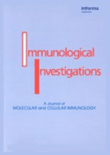
IMMUNOLOGICAL INVESTIGATIONS
Transforming Research into Impactful Immunological InsightsIMMUNOLOGICAL INVESTIGATIONS, published by Taylor & Francis Inc, is a leading journal in the field of immunology and related medical sciences, with an established presence since 1972. With a focus on cutting-edge research and critical insights in immunological methods and theories, this journal serves as a pivotal platform for researchers, professionals, and students alike. Though it currently holds a Q3 ranking in Immunology and a Q2 ranking in miscellaneous medicine as of 2023, its Scopus rank of #129 out of 236 reflects its dedication to advancing the understanding of immune responses and therapies. The journal's commitment to rigorous peer review and high-quality publications enables it to remain relevant and influential in the ever-evolving landscape of immunological research. Subscription is required to access its extensive archive, which spans critical developments in the field of immunology from 1972 to 2024.
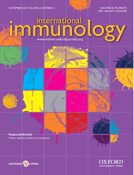
INTERNATIONAL IMMUNOLOGY
Elevating the Standards of Immunological Research Worldwide.INTERNATIONAL IMMUNOLOGY, published by OXFORD UNIV PRESS, stands out as a premier journal in the field of immunology, providing a vital platform for disseminating groundbreaking research and innovative developments within the discipline. With an impressive Q1 ranking in Immunology and Allergy, as well as in Medicine (miscellaneous), it consistently showcases high-impact studies that contribute to the advancement of immunological knowledge. The journal spans over three decades, from its inception in 1989 to its ongoing contributions as of 2024, thus solidifying its reputation in the scientific community. Researchers, professionals, and students will find valuable articles that delve into the complexities of immune responses, therapeutic interventions, and emerging immunological paradigms, ensuring INTERNATIONAL IMMUNOLOGY remains at the forefront of knowledge in the life sciences.
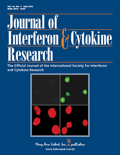
JOURNAL OF INTERFERON AND CYTOKINE RESEARCH
Advancing Immunology Through Innovative ResearchJOURNAL OF INTERFERON AND CYTOKINE RESEARCH, published by Mary Ann Liebert, Inc, stands out as a pivotal resource in the fields of immunology, virology, and cell biology, providing comprehensive insights into cytokine functions and their roles in immune responses. With ISSN 1079-9907 and E-ISSN 1557-7465, the journal aims to disseminate innovative research that advances our understanding of interferon and cytokine biology, a crucial aspect for developing therapeutic strategies against various diseases. Covering a broad scope of research from 1995 to 2024, it boasts a respectable impact factor within its category quartiles, ranking Q2 in Medicine (miscellaneous) and Q3 in the domains of Cell Biology, Immunology, and Virology as of 2023. While it does not provide open access options, the journal remains essential for academics, researchers, and professionals dedicated to exploring the complexities of immune signaling pathways and their implications for health and disease. The journal’s consistent contribution to scientific discourse underscores its importance in elevating query-driven studies to foster advancements in biomedical science.
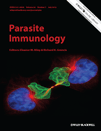
PARASITE IMMUNOLOGY
Innovative Insights into Immunology and Parasitology.PARASITE IMMUNOLOGY, published by Wiley, is a leading journal in the field of immunology and parasitology, with an ISSN of 0141-9838 and E-ISSN of 1365-3024. Since its inception in 1979, it has played a pivotal role in advancing our understanding of host-parasite interactions, immunological responses to parasitic infections, and the mechanisms of immunological resistance. The journal is adeptly positioned within the academic community, currently holding a prestigious Q2 ranking in Parasitology and a Q3 ranking in Immunology for 2023, indicating its significant influence and relevance. Its comprehensive scope attracts a diverse readership, contributing to the discourse surrounding novel therapeutic approaches and emerging challenges in parasitic diseases. With a consistent convergence of research until 2024, PARASITE IMMUNOLOGY is an essential resource for researchers, professionals, and students seeking to deepen their knowledge and foster collaboration in these dynamic fields. Although it is not an open-access journal, the insights shared within its pages are invaluable for shaping future research trajectories.

ImmunoTargets and Therapy
Empowering Research, Enhancing LivesImmunoTargets and Therapy is a leading open access journal published by DOVE MEDICAL PRESS LTD, dedicated to advancing the field of immunology and its various therapeutic applications. Since its inception in 2012, the journal has rapidly become a vital resource for researchers, professionals, and students, achieving notable recognition with a Q1 ranking in both Immunology and Immunology and Allergy categories as of 2023. With an impressive Scopus ranking of #22 out of 233 in Medicine - Immunology and Allergy, and #25 out of 236 in Immunology and Microbiology, this journal maintains a 90th percentile standing in its field. ImmunoTargets and Therapy not only publishes original research articles, reviews, and clinical studies, but also fosters an inclusive platform for the dissemination of innovative findings critical to the fight against immunological disorders. Based in New Zealand, it serves a global audience, promoting knowledge exchange and collaboration through its open access model.

BMC IMMUNOLOGY
Bridging Gaps in Immune System UnderstandingBMC Immunology is a prominent open-access journal published by BMC that has been at the forefront of immunological research since its inception in 2000. Based in the United Kingdom, this journal aims to advance the understanding of immune system functions and disorders through high-quality, peer-reviewed articles. With an impressive scope encompassing various facets of immunology, BMC Immunology has earned a Q3 ranking in the Immunology category according to the 2023 category quartiles, demonstrating its growing impact and relevance in the scientific community. Researchers and professionals will find valuable insights in its array of published works, spanning both foundational studies and innovative applications. The journal's commitment to open access ensures that cutting-edge research is freely available, fostering collaboration and advancement in the field. For those looking to stay updated on the latest developments in immunology, BMC Immunology stands as an essential resource for researchers, professionals, and students alike.

Autoimmune Diseases
Unlocking breakthroughs in autoimmune disease management.Autoimmune Diseases is a leading open-access journal published by Hindawi Ltd, dedicated to advancing the understanding and treatment of autoimmune disorders. Since its inception in 2010, this journal has provided a vital platform for researchers, clinicians, and students to share innovative findings and insights from the field of immunology. With an impressive Scopus ranking that highlights its relevance, particularly in the areas of Immunology and Microbiology and Immunology and Allergy, Autoimmune Diseases occupies a key position in the scientific discourse, ranking in the top quartiles across various categories. Researchers publishing in this journal benefit from a wide audience and high visibility, reflecting the increasing importance of understanding autoimmune diseases in today’s health landscape. Accessible to all, the journal promotes collaborative research and discussion, making it an essential resource for anyone dedicated to the study and management of autoimmune conditions.